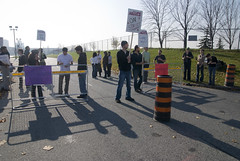Just over a month ago, the 24,000 inside and outside civic employees that keep Toronto clean and safe went on strike. They still are on strike, affecting garbage collection, parks and recreation programs, ambulance services, and
 Image by Gavatron via Flickr
Image by Gavatron via Flickr
Late last night, Via Rail, Canada’s national passenger rail service announced that locomotive engineers would be in a legal strike position this Friday. Today, they reduced service on some routes, to avoid stranding people across the country in the event a strike were to take place.
The world of work is not what it once was. The economy has shrunk – not only are people losing their jobs in record numbers not seen since the Great Depression, but many of those jobs are gone forever. Companies aren’t planning on asking many of those people back, instead they are looking at combining roles, so one person may be doing the job of two, or more employees.
 Image by Getty Images via Daylife
Image by Getty Images via Daylife
That is if the company is lucky enough to still be. Many companies have gone out of business completely, others have had to go into bankruptcy protection to dodge their creditors long enough to regroup – not to name names – General Motors (GM).
We do live in challenging times, which might explain why labour unions are fighting harder for what they believe are the best interests of their members.
Can’t blame them for trying, but part of the collective bargaining is negotiating.
Negotiating involves compromise, a give and take on both sides to ensure a fair work arrangement for all parties.
Problem is, unions these days seem to have forgotten this, because they stand firm, holding out for the impossible, even when the companies they deal with try to come up with a balanced and fair compromise.
The City of Toronto has proposed several such compromises, giving the union some of what they want for their members. The union on the other hand, continues to hold the city and its resident’s hostage, saying they want it all, or no deal.
That was the problem for the union representing the Teaching Assistants and part-time faculty at York University as well. Though as the strike continued, public support shifted away from the hard working employees out on strike, turning instead towards the poor students unable to get their education.
The longer a strike lasts, the less support the union and its members have, and that prejudiced attitude can continue long after the strike.
 Image by Gavatron via Flickr
Image by Gavatron via Flickr
Many years ago, when Major League Baseball Players went on strike, causing the season the end early, the jokes circulating about grown men – most younger than you and me – playing a kids game for millions of dollars, going on strike weren’t just jokes. It took several years for fans to warm up to spending money on tickets, ball caps, team jerseys and other such items again. Some baseball teams went out of business or were bought out and relocated because people simply weren’t going to the games – remember when Montreal had the Expos?
Most people are lucky in this economy to have a job of any kind, many don’t get benefits, and job security is pretty much unheard of in today’s working world. So it is hard for most of us to sympathize with a group of people out on strike, until they get something most of us don’t have.
Yet unions continue to fight for job security, and better benefits for their members, holding out until provincial or federal governments step in. Provincial or federal governments will intervene with their mediators, to bring both sides together through negotiations. But, when the union continues to hold out, failing to negotiate, the government has no choice but to order the employees back to work.
And when unionized employees are ordered back to work, the whole collective bargaining process has failed.
![Reblog this post [with Zemanta]](http://img.zemanta.com/reblog_b.png?x-id=a3ceb73b-3702-4fb3-b5c9-cf995573bf2f)








No comments:
Post a Comment